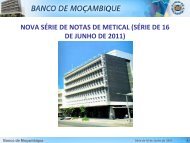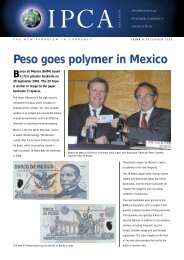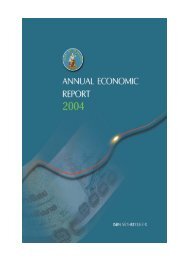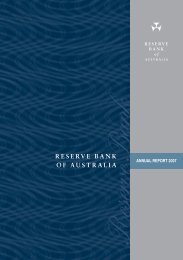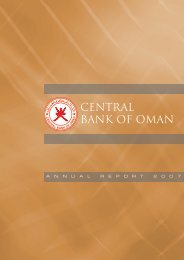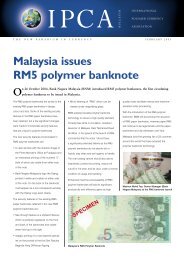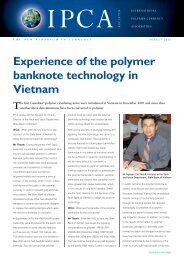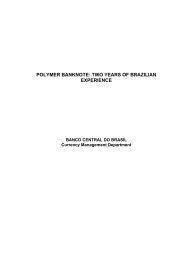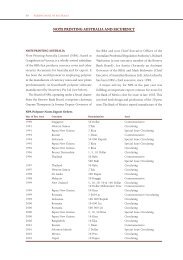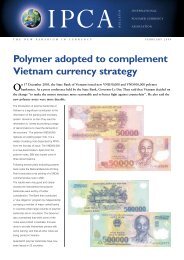Reserve Bank of Australia Annual Report 2011
Reserve Bank of Australia Annual Report 2011
Reserve Bank of Australia Annual Report 2011
You also want an ePaper? Increase the reach of your titles
YUMPU automatically turns print PDFs into web optimized ePapers that Google loves.
International Financial Co-operation<br />
The <strong>Reserve</strong> <strong>Bank</strong> actively participates in work aimed at improving the global financial architecture and<br />
addressing the ongoing challenges facing the global economy. It does so through its membership <strong>of</strong> global<br />
and regional fora and its close bilateral relationships with other central banks.<br />
Group <strong>of</strong> Twenty (G-20)<br />
The G-20 continues to play a prominent role in co-ordinating international efforts to address global economic<br />
and regulatory issues. G-20 leaders met in Seoul in November 2010, and the ongoing work <strong>of</strong> the G-20<br />
continues to be overseen by G-20 finance ministers and central bank governors and their deputies.<br />
At the Seoul Summit, G-20 leaders released the ‘Seoul Action Plan’ outlining policy commitments by G-20<br />
members as part <strong>of</strong> the ‘Framework for Strong, Sustainable and Balanced Growth’. The Framework initiative,<br />
which was launched at the Pittsburgh Summit in September 2009, provides a mechanism for countries<br />
collectively to assess the consistency <strong>of</strong> their policies with a durable global economic recovery. A recent focus<br />
<strong>of</strong> the Framework exercise has been members’ external positions, and finance ministers and central bank<br />
governors announced at their April <strong>2011</strong> meeting that they had agreed on a set <strong>of</strong> guidelines to assist<br />
in identifying ‘persistent imbalances’ that may require policy actions. It is intended that a more detailed<br />
assessment <strong>of</strong> the nature and causes <strong>of</strong> such imbalances will inform the <strong>2011</strong> ‘Action Plan’, which is due to be<br />
discussed by leaders at their Summit in Cannes in November. The <strong>Reserve</strong> <strong>Bank</strong> and the <strong>Australia</strong>n Treasury are<br />
members <strong>of</strong> a working group that is guiding the Framework exercise.<br />
In Seoul, G-20 leaders also endorsed measures to strengthen international financial regulatory arrangements,<br />
including new bank capital and liquidity standards. Ongoing work on other regulatory issues such as regulation<br />
<strong>of</strong> shadow banking remains a priority for the G-20. Another priority for the G‐20 has been to ensure that<br />
the international financial institutions, including the International Monetary Fund (IMF), have appropriate<br />
resources and governance arrangements. As discussed below, there were some significant reforms in this<br />
regard over the past year.<br />
Two additional areas <strong>of</strong> focus for the G-20 to which the <strong>Reserve</strong> <strong>Bank</strong> is contributing are reform <strong>of</strong> the<br />
international monetary system and issues pertaining to commodity prices. On the former, the <strong>Bank</strong> is<br />
represented on a working group that is considering issues regarding the management <strong>of</strong> global liquidity and<br />
capital flows, including the composition <strong>of</strong> the Special Drawing Right (SDR), financial safety nets, the<br />
development <strong>of</strong> local currency capital markets, and members’ experiences with managing capital flows. On<br />
commodity prices, the <strong>Bank</strong> is represented on a G-20 study team that has been analysing the main determinants<br />
<strong>of</strong> commodity prices, and on an experts’ group on fossil fuel price volatility. The <strong>Australia</strong>n Treasury is also<br />
participating in each <strong>of</strong> these groups.<br />
Financial Stability Board (FSB)<br />
The FSB has an ongoing role in assessing vulnerabilities in the global financial system, as well as co-ordinating<br />
the reform <strong>of</strong> the financial system architecture to minimise the probability and severity <strong>of</strong> future financial crises.<br />
The FSB has a broad membership, including representatives from 24 economies (including all <strong>of</strong> the G-20<br />
ANNUAL REPORT <strong>2011</strong> | International Financial Co-operation<br />
35



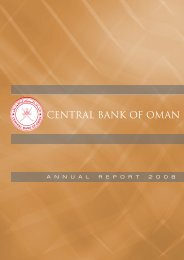
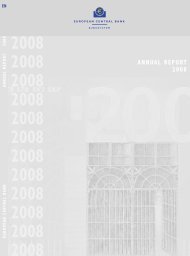
![KNOW YOUR NEW GIBRALTAR BANKNOTES - [Home] bThe/b](https://img.yumpu.com/50890985/1/184x260/know-your-new-gibraltar-banknotes-home-bthe-b.jpg?quality=85)
![PAPUA NEW GUINEA - [Home] - Polymer Bank Notes of the World](https://img.yumpu.com/49758743/1/190x143/papua-new-guinea-home-polymer-bank-notes-of-the-world.jpg?quality=85)

